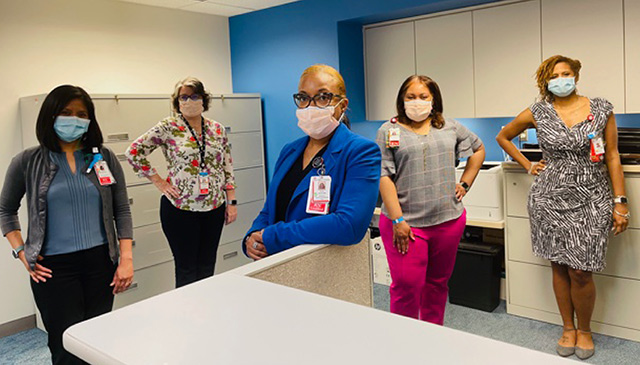
The Smart Pump Interoperability Project recently went live at the Medical Center, West Campus and The Woodlands, thanks to a committed team that pushed forward to bring the innovative technology to Texas Children’s despite disruptions from the ongoing pandemic.
Smart pumps are known to help prevent adverse drug events, especially when linked with electronic health records. These pumps include auto-programming, which allows for specific medications to be transferred directly from a patient’s records to the smart infusion pump, and auto documentation, which allows information like start and stop times to be sent electronically.
To support the project, a total of 2,111 Texas Children’s nurses completed Alaris Interoperability training and gained the skills to improve medication safety and quality practices, and reduce infusion administration errors.
Epic Trainers, Nursing Professional Development Specialists and Clinical Nursing Informaticists collaborated to deploy the training, which was provided as part of nursing education at the system level with the support of Biomedical Engineering, Information Services and Pharmacy. The curriculum included 15 online learning modules with video demonstrations and learner engagement simulations, followed by live hands-on practice.
Additionally, more than 230 nurses served as Interoperability Skill Validators and used the Rover, Alaris pump and Epic EMR integration in an interactive training environment to prepare in-patient and Emergency Center nurses to implement the new practices in time for go-live on January 19 at the Medical Center/Pavilion for Women, and February 9 at West Campus and The Woodlands. Tabletops were conducted with various specialties to assist in preparing clinicians, and a clinical readiness training video was livestreamed with the help of the Simulation Center to give nurses a view of workflows and answer their questions.
Making the project happen
The go-live was implemented in two phases to ensure that nursing staff and those working behind the scenes at each campus would have the necessary support. During the transition at Medical Center/the Pavilion, 233 current infusions were connected to smart pump interoperability. At West Campus and The Woodlands, 35 infusions were connected within just a few hours.
At the center of the effort was the Clinical Subgroup, which drove all decisions and clinical practice. The subgroup consists of clinical nurse specialists and nurse educators from across the organization.
Also instrumental were informatics resource liaisons (IRLs), who worked along with the IS Command Center to help centralize calls surrounding the project. IRLs validated other bedside nurses with hands-on demonstrations; provided necessary feedback related to decision on workflows impacting the project; relayed necessary concerns and information from other bedside staff; and provided hands-on support while maintaining their own patient care load. As trusted liaisons, IRLs communicated problems to IS and communicated their findings and additional information back to their units.
A particular point of pride was the interaction at the unit level, which proved critical to the project’s success. Led by CVICU Clinical Specialist Lauren H. Salinas, nursing staff prepared their units by providing a worksheet to transition their current infusions. At the Pavilion for Women, High- Risk OB Clinical Specialist Tara Barrick and RNC-OB Educator Coordinator Melinda Trussell led the way in validating their staff by adopting the theme, “Operation Interop.”
Praising the project’s success
Nursing staff and vendors who supported the project had plenty had of good things to say about bringing the Smart Pump Interoperability Project to life:
- “It was easier than I thought; we should have done this earlier.” – 14WT RN
- “The modules made this way scarier than it truly was.” She said “I felt like I was going to forget something when it’s actually just 2 more steps to our BCMA process.” – 12WT RN
- “So far, it’s been a smooth transition with no major issues!” – West Campus PICU RN
- “Back association is beautiful where I never have to guess and go all the way back in the MAR then document my fluid. With back association, it all pulls in and do it right there at the bedside with another nurse.” – RN Float Nurse West Campus
- “That is excellent work! The average pumps go live will see organizations hover at around 70% compliance for the first week, so we’re trending above that which is great news.” – Bryan K. (Epic TS)
- “This is the best go-live I have ever supported. Expect some phone calls from our other pediatric customers.” – BD support team

